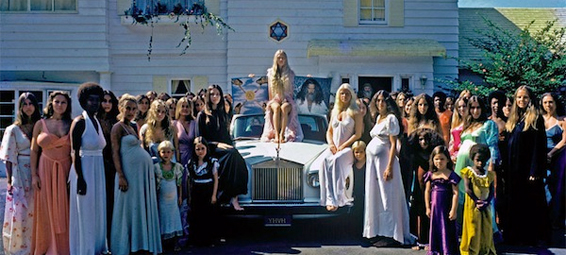The idea of the hippie commune — idealist, utopian communities founded in a haze of exuberant mysticism, doting guru fidelity, and marijuana smoke – likely conjures up vague generalities: white robes, white-eyed meditation sessions, alfalfa sprout diets. Many of these stereotypes owe their source to a real California cult called The Source Family, which was founded by a charismatic ex-marine restauranteur who opened a vegan restaurant and then staffed it with his young, hippie followers.
Maria Demopoulos and Jodi Wille’s documentary about The Source Family retells the story of the group in a way that is sympathetic, but not sycophantic We begin at the group’s height, when upwards of 140-odd people, mostly young men and women in their 20s, shared a house with their leader, Jim Baker. They woke at dawn, mediated, smoked marijuana, ate healthy foods. They married each other, gave birth to babies in inflatable bath tubs, participated in sex rituals with the leader, jammed in psychedelic rock bands, and generally pursued fuzzy notions of expanded consciousness that blurred the eastern spirituality Baker glossed from his time studying with the Indian gurus that became subculture celebrities in the late 1960s, as well as whatever improvised hucksterism Baker invented on the spot. As one former member describes it: “[Baker] was part spiritual guru, part Lenny Bruce.”
Because The Source Family’s story follows the cliché of the spiritualized hippie so closely the documentary’s narrative has an air of familiarity (there’s even an outtake from a late 1970s Saturday Night Live sketch that seems directly pointed at this group, suggesting that the The Source Family, to some extent, created the stereotype). The story arc, at least, is familiar: group grows around the personality of a questionable sociopath, deepens in its fidelity, and the splinters when the head is removed. But what really makes The Source Family such a compelling film are the interviews with former members, some of whom remain faithful to Baker’s teaching and legacy, and others who still swear by the authenticity of their experience. In fact, just a few who are skeptical or regretful of their time with group, though a common reaction goes like this: “I’m glad I did it, but I’d never do it again.” Some former members speak about situations in which they believed they were transported into transcendent states of enlightenment thanks to Baker’s teaching, and in one instance, by merely touching the guru on his shoulder. It really happened, they swear, it wasn’t an illusion — these were real, empirical spiritual experiences. And who are we to tell them it didn’t?
That’s where The Source Family gets really interesting. Most of us skeptics will merely take these experiences as psychosomatic reactions occurring within the context of an intense, hyper-spiritualized environment. But The Source Family implicitly raises more challenging questions about the nature of religious experience and the way those experiences inform a kind of scriptural legend around their source. Because Baker was active in the 1970s, we can document his life, know the ins-and-outs of his practice, and question his authenticity based on his erratic and questionable behavior. But if Baker lived 4,000 years ago, 2,000 years ago, or 1,200 years ago, and we couldn’t so easily document incongruities between his life and his teaching, who’s to say what kind of shelf life this spiritual legend might have had?






